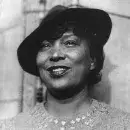
Zora Neale Hurston
Zora Neale Hurston was a folklorist and writer associated with the Harlem Renaissance who celebrated African American culture of the rural South.
Born in Alabama and raised in Florida, she was educated at Howard University (1921–1924) and Columbia University’s Barnard College (B.A., 1928), where she studied with Franz Boas and Ruth Benedict. While at Howard, Hurston cofounded The Hilltop, the university’s student newspaper. In 1934, she published her first novel, Jonah’s Gourd Vine, which portrayed African American life without stock figures or sentimentality. Mules and Men, a study of folkways among African Americans in Florida, followed in 1935. Other works included the novel Their Eyes Were Watching God (1937); Tell My Horse (1938), a blend of travel writing and anthropology based on her investigations of voodoo (Vodou) in Haiti, supported by a Guggenheim fellowship; and the novel Moses, Man of the Mountain (1939).
In 1934, Hurston established a school of dramatic arts “based on pure Negro expression” at Bethune-Cookman College (later University), a historically Black college in Daytona Beach, Florida. In 1939–1940, Hurston served on the faculty of North Carolina College for Negroes (now North Carolina Central University) in Durham. Later, she was on the staff of the Library of Congress.
Her autobiography Dust Tracks on a Road was published in 1942, and her last novel, Seraph on the Suwanee, appeared in 1948. Hurston’s works concerned both the African American experience and her struggles as an African American woman. Her novels went relatively unrecognized by the literary world for decades. Interest in Hurston’s work was revived in 1975, fifteen years after her death, when author Alice Walker published an article, “In Search of Zora Neale Hurston” (later retitled “Looking for Zora”), in Ms. magazine.
In 1995, The Library of America honored Hurston by publishing two volumes that encompassed her folklore, memoirs, novels, stories, and other writing. In 2001, Hurston’s manuscript Every Tongue Got to Confess, a collection of folktales gathered in the 1920s, was published after being discovered in the Smithsonian archives. Her nonfiction book Barracoon: The Story of the Last “Black Cargo” (2018), about the life of Cudjoe Lewis (Kossola), one of the last survivors of slaves brought illegally to the United States in 1860, was published posthumously.